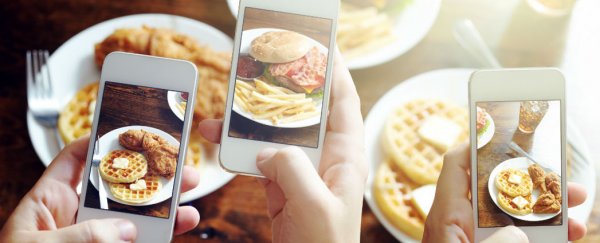Keeping track of your calorie intake can be a labourious and time-consuming process - so much so that very few of us stick to it diligently. But that could be about to change thanks to a new photo recognition application developed by Google, which can assess the number of calories on a plate from nothing more than a picture of it. Imagine posting a foodie photo to Instagram and then getting a calorie report back instantly.
First the AI tries to identify the foods on show, then it works out the size of the portions based on the size of the plate and other cues in the image - like the size of a ketchup bottle. Recently unveiled at the Rework Deep Learning Summit in the US, the software could potentially make tracking food intake and nutrition statistics much more straightforward. That said, these are early days for the software, and Google confirmed to CNET that no consumer products are on the roadmap yet.
The experimental software has been dubbed Im2Calories and doesn't necessarily need high-definition images to work, so your shaky mobile photos will do just fine. Google's Kevin Murphy, one of the scientists working on the project, says the current program only works around a third of the time, but as it gathers more data it will become more accurate.
"To me it's obvious that people really want this and this is really useful," Murphy told Popular Science. "Fine, maybe we get the calories off by 20 percent. It doesn't matter. We're going to average over a week or a month or a year. And now we can start to potentially join information from multiple people and start to do population level statistics. I have colleagues in epidemiology and public health, and they really want this stuff."
Like most AI systems, the more data it has the better it works, which is why it should improve over time - once Im2Calories has photos of 1,000 burgers to work from rather than 100, it's more likely to recognise that gourmet slice of beef you've ordered for yourself. And if you can quickly snap a photo of it with your fitness app rather than having to enter the food and calories manually, keeping track of your diet becomes much more straightforward.
Murphy sees plenty of other uses for the software too, besides health and fitness. The same depth-sensing image technology could analyse an urban street, for example, and spot free parking spaces or work out how much traffic is moving through the road - collecting this kind of data could be invaluable aid to local authorities and city planners. However the photo-scanning AI technology is eventually deployed, whether for counting calories or cars or something else, its impact will be substantial.
If Google does produce a calorie counter app in the near future, it's probably best to treat it as a rough guide to what you eat rather than building your diet regime around it. Various studies have called into question the effectiveness of calorie management and the accuracy of food labels, so much so that Weight Watchers has abandoned its calorie-first approach in recent years.
